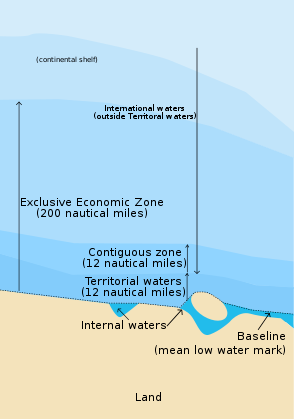ForumIAS announcing GS Foundation Program for UPSC CSE 2025-26 from 19 April. Click Here for more information.
ForumIAS Answer Writing Focus Group (AWFG) for Mains 2024 commencing from 24th June 2024. The Entrance Test for the program will be held on 28th April 2024 at 9 AM. To know more about the program visit: https://forumias.com/blog/awfg2024
What is the News?
India protested the U.S. decision to conduct a patrol in the Indian Exclusive Economic Zone (EEZ) in the western Indian Ocean.
What is the Exclusive Economic Zone(EEZ)?
- The 1982 United Nations Convention on the Law of the Sea (UNCLOS) defines an Exclusive Economic Zone(EEZ). It is an area that shall not extend beyond 200 nautical miles from the baselines. The EEZ is measured from the breadth of the territorial sea.
India’s Exclusive Economic Zone(EEZ):
- India has the 18th-largest exclusive economic zone(EEZ). It includes the Lakshadweep island group in the Laccadive Sea, Andaman and Nicobar Islands at the Bay of Bengal, and the Andaman Sea.
- India’s EEZ bordered to the west by Pakistan. In the south, it is bordered by the Maldives and Sri Lanka. Similarly, in the east, Bangladesh, Myanmar, Thailand, Malaysia, and Indonesia.
Exclusive Economic Zone(EEZ) of India Definition:
- India has legally defined the concept of EEZ in its “Territorial Waters, Continental Shelf, Exclusive Economic Zone and Other Maritime Zones Act, 1976”.
- According to the Act, the EEZ of India is an area beyond and adjacent to the territorial waters. The limit of such a zone is two hundred nautical miles from the baseline.
- Powers: In the exclusive economic zone, the Central Government has:
- Firstly, Sovereign rights for the purpose of exploration, exploitation, conservation, and management of natural resources. This includes both living and non-living as well as producing energy from tides, winds, and currents, etc.
- Secondly, the government has exclusive rights and jurisdiction over certain matters. This includes the construction, maintenance, or operation of artificial islands, off-shore terminals, installations, and other structures.
- Thirdly, the government also has exclusive jurisdiction to authorize, regulate and control scientific research;
- Further, the government has exclusive jurisdiction to preserve and protect the marine environment and also to prevent and control marine pollution
- The government also has other rights also as recognized by International Law.
- Further, no person (including a foreign Government) shall violate the provisions by exploring or exploiting any resources. Also, no person(or foreign government) carry out any search or excavation or conduct research within the EEZ of India. The person(or foreign government) has to get the license or a letter of authority from the Central Government to perform such activities.
Source: The Hindu





